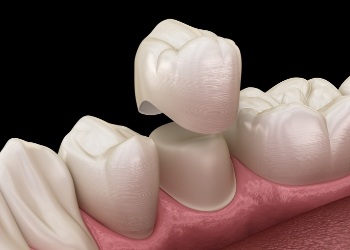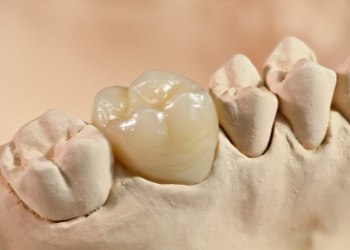Dental Crowns in Gorham
We Believe in Showing the Best Version of Yourself

Have you been told that you need a dental crown? It's natural to feel concerned about whether people will notice your repaired tooth. At Morgan Dental Care, we believe that everyone deserves a smile they can be proud of. Our crowns use natural-looking materials that emulate the beauty of real enamel, reflecting light just like your natural teeth. If you're dealing with a damaged or severely decayed tooth, don't wait any longer to reclaim your confident smile. Contact Morgan Dental Care today and take the next step towards a smile you'll love!
Why Choose Morgan Dental Care for Dental Crowns?
- CEREC Same-Day Restorations
- Natural-Looking, High-Quality Dental Materials
- Digital Impression System
What Are Dental Crowns?

Dental crowns are small caps that are customized to fit over the biting surface of your teeth to provide them with additional strength and protection. They act to repair the shape, size, and structure of your teeth so you can continue using them as you normally would without experiencing uncomfortable side effects due to a weakened structure. That way, you can chew your food without having sharp pain caused by tooth sensitivity.
Crowns are incredibly versatile restorations that can be made from a variety of materials, including metal, ceramic, and porcelain. However, we typically craft them from natural-looking substances so our patients can smile without feeling self-conscious about having a piece of metal in their mouths.
Why Do You Need a Dental Crown?

We recommend dental crowns to our patients for a variety of cosmetic and restorative reasons. Some of the most common situations in which we may suggest a dental crown include:
- A Severely Decayed Tooth: If you have a tooth that has a large dental filling in it, we may recommend placing a dental crown over the top of it to hold it securely in place.
- Forced Trauma: To repair and support severely broken teeth, dental crowns are often recommended.
- Root Canal Therapy: After root canal therapy, we often top our patients’ treated teeth off with a dental crown to restore the structure and strength.
- Fixed Bridges: Patients who have missing teeth can benefit from a fixed bridge held in place by two dental crowns.
What Is the Procedure for Getting a Dental Crown?

At Morgan Dental Care, our dentists are specially trained to craft CEREC same-day crowns in-office, so you won’t have to come in for a second appointment. We’ll begin by preparing your tooth and removing a small layer of enamel so the restoration can comfortably fit over it. Using our digital impression system, we’ll capture measurements and images of your mouth to model your permanent crown. Within 15 minutes of transferring the blueprint of the crown we crafted to our in-house milling machine, we’ll be able to permanently place it.
When you leave our office, you’ll be able to enjoy your beautifully restored smile that feels comfortable and strong.
Understanding the Cost of Dental Crowns

One of the most effective ways to treat teeth that have been affected by damage or decay is with custom and lifelike dental crowns. These protective caps can help rebuild the structure and durability of a tooth while keeping it safe from future harm. Still, knowing how much you’ll need to pay for the treatment is important, as you won’t want any surprises. We’ll discuss every detail of the procedure during your consultation, including the cost of dental crowns. Until then, here’s what you should know.
Factors That Affect the Cost of Dental Crowns
The overall price of dental crowns can be influenced by a few varying factors, including:
- Complexity of the Damage: If you require additional services, such as root canal treatment, before receiving a dental crown, then you’ll likely have to pay more for repairing your tooth.
- Materials Used: Your dental crown can be constructed out of various materials, such as gold, amalgam, or porcelain—each of which will have different price points. Our team uses porcelain for its durability, longevity, and natural-looking results.
- Treatment Timeframe: Your dental crown cost can be different depending on how quickly you choose to repair your tooth, as we offer both traditional and CEREC same-day crowns.
Don’t forget that going for restorations that have lower costs won’t typically be better for you. The higher the quality of the dental crown, the longer they can last and the healthier they’ll be for your mouth.
Does Dental Insurance Cover Dental Crowns?
Since they’re usually considered a major restorative treatment, dental crowns can often have around 50% of the total cost covered by dental insurance. Of course, every policy will be different from patient to patient, so you’ll need to go over the details with your provider before moving forward. You can also reach out to our team so we can help you navigate your plan and file your claim for you to make the process easier.
Options for Making Dental Crowns Affordable
For those who don’t have dental insurance, you can potentially opt for alternative solutions for making your dental crowns more affordable. Our team offers plans through CareCredit that allow you to pay for your entire treatment through monthly installments instead of the total sum upfront. These plans also typically come with little to no interest, meaning you can save more in the bank while repairing and improving your smile.
Dental Crowns FAQs
Because dental crowns are one of the most versatile and therefore common treatments in dentistry, you may have heard some misconceptions about the process. You might not be entirely clear on some aspects of the treatment, but don’t worry; our team at Morgan Dental Care is here to help! Below, we’ve included the answers to some of the most common questions about dental crowns in Gorham that we hear from our patients. To learn more and ask any questions that you don’t see answered on this page, we encourage you to contact us and set up an appointment!
Do Dental Crowns Get Cavities?
The crown itself can’t get cavities, but the natural tooth underneath still can. In fact, a crowned tooth has about the same likelihood of becoming decayed as any other tooth. As with natural teeth, the risk of cavities depends on how well you maintain your oral hygiene. Failing to brush and floss adequately makes it easy for harmful bacteria to slip under the crown and attack the underlying tooth, causing decay. This is why regular brushing, flossing, and dental checkups are essential whether you have a crown or not.
Are Dental Crowns Permanent?
Dental crowns are technically not permanent, but they are a durable solution for protecting your tooth. On average, a crown can last between 10 and 15 years – possibly even longer if you take really good care of it.
While a crown itself won’t last forever, the changes that we make to a tooth before placing a crown are irreversible. Once we have reshaped the tooth and removed the enamel, it will not regenerate, meaning that the tooth will need a crown to protect it from here on out. Keep in mind, though, that since crowns shield the tooth from further damage, they might end up helping your tooth last for much longer than it would have otherwise.
What Happens If You Wait Too Long to Get a Dental Crown?
As a general rule, your dentist in Gorham will only recommend a dental crown if your tooth absolutely needs one. If we tell you that you need a crown, you might be tempted to put off scheduling the procedure, especially if your tooth isn’t bothering you at the moment, but it’s best to get it taken care of sooner rather than later. If your tooth remains unprotected for too long, it will be exposed to biting and chewing forces, food debris, and bacteria that could put it even more at risk. After enough time has passed, that tooth might require a root canal or even an extraction! Getting a crown soon after we recommend it is one way to minimize the chance of needing more extensive dental work down the road.
Does It Hurt to Get a Dental Crown?
Much like with a filling, one of the first steps in the dental crown process is making sure you’re fully comfortable and that your mouth is numb. We’ll administer local anesthetic to the area so that you don’t feel any pain during your procedure. The numbness will wear off after a few hours, which is why we recommend taking an over-the-counter pain reliever, such as ibuprofen, before that point. Your tooth might be a little sensitive or sore for the next few days, but this should be mild and temporary.
